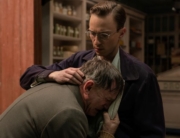
In 2011, former Army veteran Nico Walker was arrested for robbing multiple banks as a means of fueling his heroin addiction, an experience he adapted while incarcerated into his 2018 semi-autobiographical novel Cherry. His movie counterpart, played by Tom Holland, is similarly never called by that name. The title refers to an offhand comment by a senior Army officer on how the protagonist got his “cherry popped” in the field of combat. Tonally, this nonchalant, almost nihilistic outlook offers a preview for what’s to come.
Directed by MCU masterminds Joe and Anthony Russo, who first introduced audiences to Holland as the new Spider-Man in 2016, Cherry is certainly a more grounded entry compared to their recent superhero projects. The opening monologue from 23-year-old Cherry (Tom Holland) provides a glimpse into his mindset: he “doesn’t understand what people do” for a living but seems pretty experienced when it comes to robbing banks, addressing viewers fourth wall–style about how he pulls off a heist.
We then back up to his college-age self in Cleveland, Ohio, to see that things weren’t much better back then, as he trudges through an endless cycle of dead-end jobs, Xanax pills, and an unhelpful bank teller in the post-9/11 climate. A bright spot lies in Emily (Ciara Bravo), who Cherry meets in college and falls in love with instantly, briefly finding happiness despite his lack of direction.
This romance-turned-marriage is only the first of five chapters detailing how Cherry ended up spiraling down a dark path. After Emily responds negatively to his professing the loaded words “I love you,” he enlists with the U.S. Army in a spontaneous spur of the moment decision, exchanging one relationship for another that’s less nurturing by comparison. Army boot camp is presented as a long series of abuses from drill instructors, who are part of a military that believes its own hype at the start of the Iraq War. He somehow survives it all, albeit with more drugs and a growing nihilistic attitude and eventually ropes Emily into the dope life with him full-time.
Viewers all too familiar with Holland’s Peter Parker will find a similar awkwardness but little optimism in his Cherry performance. The actor’s boyish looks become more sunken and his behavior neurotic as unfettered PTSD leads Cherry to take OxyContin, only to become a full-on addict.
It’s not particularly a groundbreaking story line, but the Russos at least keep the movie from feeling conventional visually, utilizing saturated color filters and fourth wall breaks to project the disjointed mind of an addict. This mindset, of course, eventually becomes the catalyst for Cherry’s short-lived bank robber status. Just like with the military, one dangerous community is exchanged for another, albeit this time with more openly amoral participants like his dealer, Pills and Coke (Jack Reynor).
Special acting credit should go to Ciara Bravo, formerly of Nickelodeon’s Big Time Rock fame, who holds her own as Cherry’s emotional rock and accomplice. Despite loving her husband, Emily equally loves the feeling of a heroin high, and the pair delve further and further into the search for stronger drugs that makes their romance tragic by default.
If there’s a caveat to this dynamic, it’s that the film jumps from scene to scene so much that there’s little time to fully understand its couple beyond what the plot demands. These characters are meant to be emblematic of a failed 21st-century Americana, but all we see of the world is their perspective, which requires the audience to take Cherry’s big issues at face value. It is, as a result, a well-shot film that tells a bit more than it shows.
Cherry tackles a lot of issues across its extended running time: youthful malaise, PTSD, the opioid crisis, and Midwestern economic collapse. However, this kind of tale has been told so much in various entertainment forms that, even with the strong performances, there’s no guarantee that Cherry will stand out from the crowd, despite some moments of amusing dark comedy in between the drama.






Leave A Comment